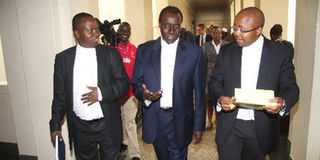Relief as judges switch on TVs

From left: Media Owners Association lawyers Henry Kurauka, Paul Muite and Issa Mansour leave the Court of Appeal yesterday. Judges halted the digital television migration for Nairobi to February. PHOTO/NATION
What you need to know:
- The three appellate judges unanimously granted the request after a three-hour long hearing to determine whether media owners had an arguable case and whether granting an order halting the digital migration would prejudice any party.
Television viewers Friday got a reprieve when the Court of Appeal temporarily stopped migration to digital TV, which had denied millions their favourite channels.
Appellate judges Kihara Kariuki, Alnashir Visram and Hannah Okwengu granted a request by the Nation Media Group, the Royal Media Services and the Standard Group to halt the switch-off until their appeal is heard and determined.
“The applicants’ request is hereby granted for a period of 45 days from the date of this order and we accordingly restrain the Ministry of Information and Communications and Technology as well as the CCK from switching off the applicants’ analogue frequencies, broadcasting spectrums and broadcasting services, and if already switched off, to reinstate the same pending the hearing and determination of the intended appeal on or before February 6, 2014,” Court of Appeal President Kihara Kariuki ordered on behalf of the Bench.
The three appellate judges unanimously granted the request after a three-hour long hearing to determine whether media owners had an arguable case and whether granting an order halting the digital migration would prejudice any party.
“We have formed an opinion that there are grounds for an arguable appeal and that such appeal would be rendered insignificant should we not grant the order of restriction sought,” Justice Kariuki said.
The Bench said it would provide the reasoning for its decision on January 31.
In the ruling, the court took note of the government’s efforts through a series of transitional mechanisms to guide the move from analogue to digital broadcasting.
Fully comply with order
Minutes after the ruling was delivered, Information and Communications Cabinet Secretary Fred Matiang’i said his ministry would fully comply with the order.
“My ministry will unfailingly and unreservedly comply with the Court of Appeal order halting digital migration,” Dr Matiang’i tweeted.
During the hearing, the government, through State Counsel Njoroge Mwangi, had argued that digital migration did not start with the switch-off, but was a process, which media owners were aware of and had been involved in.
He said that the shift began with a conference held in May 2006 and was a process that had taken eight years of preparation.
The media owners were blocking technological advancement, he argued.
The three media houses had lost a tender bid and rejected government’s suggestions twice and instead chose to apply for digital licences outside the right procedure, the state lawyer argued.
“Media owners cannot say this is an attempt to discriminate them as content providers,” Mr Njoroge said and defended the government as acting in line with the International Telecommunications Union (ITU) convention.
Lawyer Issa Mansur for the media organisations had previously told the court that NTV, KTN and Citizen TV had switched off in compliance with the law.
However, despite the international obligation to move to digital broadcasting, the Kenyan Constitution was supreme, the lawyer submitted.
“Media switched off in compliance with statutory notice; we cannot broadcast without protection. Yes, we have international obligations, but the Constitution must be followed, and we have come to court for a constitutional right not favour as implied,” Mr Mansur said.
All the three judges questioned the urgency to switch off before the June 17, 2015 deadline imposed by the ITU.
Operating analogue alongside digital
Justice Kariuki wondered what was the difficulty in operating analogue alongside digital broadcasting?
Justice Visram posed: “What is happening that this decision must happen today?”
The judge asked why the government was keen to enforce the shift when an appeal on the matter was pending, while Lady Justice Okwengu sought to know whether postponing the migration by 30 to 40 days would imply Kenya was not moving forward.
In response, Mr Njoroge said media owners were at fault as they had not attempted to present a work plan showing they had tried to comply with the digital migration. If that had happened, the situation would have been different, he argued.
CCK lawyer Wambua Kilonzo accused the media houses of halting a process that had already taken off.
It was impossible to reverse a process that began in 2006, he submitted.
“There are a number of players involved. We are creating a recipe of chaos,” he said.
“Frequencies are a resource that is planned for. There are certain possibilities of interference not only on national arena but internationally as well,” he added.
Mr Paul Muite, the other lawyer for the media companies, said that their clients were not merely concerned about advertising revenue, but that sections of the Constitution regarding freedom of information had been violated.
The media owners had permitted only DStv to air their content and not any the other pay TV channel, he submitted.
Following the Court of Appeal order, the three TV stations resumed broadcasting.





